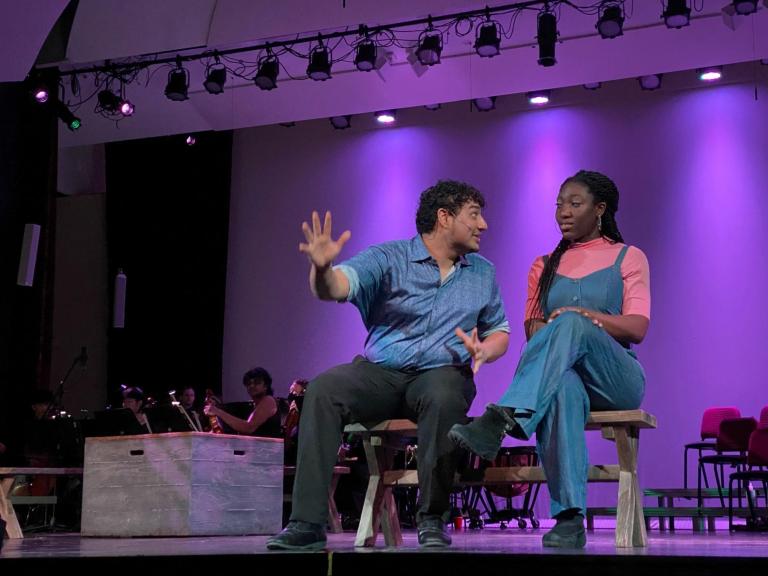What do you get when you mix Western musical tradition with the college experience? The Department of Music answered that question with their annual production, this past Thursday through Saturday.
Titled “First Night at the Opera/Edges,” the show fused performance genres to deliver a very “meta” plot. The first half is the story of audience members arriving to attend an opera premiere, told through the original operatic work of Stanford music theory director Giancarlo Aquilanti. The opera itself is subsequently portrayed through Benj Pasek and Justin Paul’s 2005 work “Edges” — but through the medium of musical theater.
I immensely enjoyed the production overall. Aquilanti’s “First Night” offered some well-crafted moments of intensely moving beauty amid the commotion of an anxious composer’s first opera. The performance of “Edges” presented a very raw and genuine depiction of the college experience. However, the show was limited by some of its orchestral shortcomings and a confusing thematic link.
“First Night at the Opera”
The “meta” effect of the show’s first half made for a unique and charming viewing experience. Having the “audience member” characters enter from the same places as real audience members offered a playful twist on the idea of who is watching, and hinted that the “real” show — “Edges” — hadn’t started yet. The auditorium lights that usually dim to signal the start of a performance were even kept on, illuminating audience members and actors alike throughout “First Night.”
The chaotic beginning of “First Night” revealed the frenzy of emotions that different characters experienced in anticipation of the opera, from the composer’s building nerves to the confused entry of inexperienced audience members.
The unenthusiastic character Joe (played by Mauricio Alvarez ’27) voiced the concerns of a first-time opera listener as he asked about the language of the opera and expressed shock at its three intermissions. As someone who only recently started watching opera myself, it was quite amusing to see his trepidation and overall apathy. References to incredibly famous operas like Verdi’s “Rigoletto” and Bizet’s “Carmen” provided fun moments and helped the audience relate to what might be an unfamiliar genre.
One highlight was the duet featuring opera aficionado Clara (played by lecturer and vocalist Wendy Hillhouse MLA ’18) and her husband Robert (Michael Murphy). The two reminisce on their experiences in opera, offering a beautiful peek backward in time through an interchange of voices threaded by running string lines. It is such a nostalgic and beautiful scene, with fantastic singing and pacing.
I do wish that there had been more coordination in the string section. Some areas that needed to move in service of the melodic line felt static; a more unified movement and feeling would have done much to elevate the scene.
Another highlight of the opera for me was the solo performed by opera lover Lila (played by Julia Yu M.A. ’24). Her beautiful singing drew me into her character’s perspective, with incredibly controlled and intense crescendos contrasting delicate subito pianos (becoming suddenly quieter in volume).
Her character has little experience in attending operas despite her enthusiasm, and her rhapsodic anticipation perfectly encapsulated that nuance. Aquilanti’s orchestration was also beautiful, although limited by the same notes on execution that could’ve allowed for more space and support for Yu’s voice to shine.
“Edges”
As a whole, “Edges” was phenomenal. The actors skillfully portrayed the emotions exclusive to each piece. The connection to the college experience was clear: The emotion and ideas in each song seemed to come straight from the minds of the actors.
My favorite piece was “I Hmm You,” sung by Ecy King ’23 M.S. ’24 and Deven Bansal ’25. The song portrays two characters confused about their relationship, not knowing if they were in love with one another. So, as a compromise between liking and loving each other, they come up with the phrase “I hmm you.”
An energetic samba melody supported the awkward comedic dynamic between the two characters, eliciting a collective “aww” from the audience at its satisfying close. King’s and Bansal’s acting were fantastic, marked by facial expressions and natural vocal inflections that made the whole scene even more endearing.
College dating isn’t all sunshine, though — another reality that “Edges” didn’t fail to capture. The song “Dispensable,” performed by Iskander Nekkaz – Le Roux ’23 M.A. ’24, was a mesmerizing rendition of heartbreak. It captures the emotion of a boy who realizes his girlfriend never felt the same love as he did for her. Le Roux’s heart-shattering vocal breaks were tear-jerking, demonstrating his perfect control of raw emotion in his voice. I felt goosebumps throughout the whole song.
One of my only critiques of “Edges” would be the transition from “First Night.” While I did enjoy the dimming lights signifying the official beginning, the two seemed to lack a broader thematic link. The actors’ different characters didn’t seem to have particular thematic links to one another, and the concept of audience largely fell apart when the cast all stood up.
At the end of the day, the innovative spirit at this yearly Department of Music production was refreshingly personal and captivating. I eagerly await next year’s production!
Editor’s Note: This article is a review and includes subjective opinions, thoughts and critiques.
A previous version of this article misidentified a performer. The Daily regrets this error.
